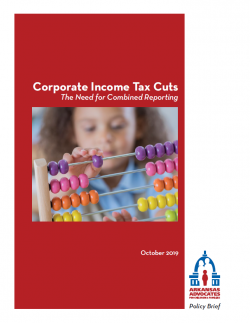
Common-sense approach to ensuring corporations pay states the taxes they’re owed can help raise state revenue without increasing taxes on everyday families.
In 2019, the Arkansas General Assembly passed legislation that required sellers outside of Arkansas to collect and pay sales taxes on all purchases made by buyers in Arkansas. This “online sales tax” policy is necessary in a modern economy. Arkansas relies heavily on sales taxes to fund its general revenue budget, which pays for things from public schools and libraries to universities and economic development programs. As Arkansas consumers have increasingly made purchases online, the state and local governments have missed out on important revenue.
But Act 822, the bill requiring the online sales tax, also included cuts to corporate income taxes. Those tax cuts are so big, the overall effect of the bill will be to reduce state general revenues beginning in 2022. Simply put, by 2022 Arkansas will raise less in taxes for its general revenue fund than it did before Act 822 was enacted. Reduced revenue typically results in cuts to programs; flat funding programs, which is effectively the same as a cut, over time; or failing to make the needed investments in programs, like not increasing funding for education enough.
In theory, corporations receiving hefty income tax cuts are assumed to pass the savings on to workers in the form of better pay or more hires. However, early evidence from the federal Tax Cuts and Job Act demonstrates that benefits from corporate tax cuts are much more likely to go to executives and shareholders, and not the workers. Only five percent of workers in the United States received either a one-time bonus or a raise because of the corporate tax cuts, meaning 95 percent of workers received nothing.
In Arkansas, hundreds of thousands of low-wage workers stand to be negatively affected in two ways by the combination of the online sales tax and the corporate tax cuts, if nothing is done to remedy the situation:
- As lower-income workers pay more in sales taxes, they will have less to spend on not only everyday necessities, but also will have less to pay down debts or save for the future.
- As the state’s general revenue declines as expected by 2022, programs needed by low-income individuals and families, such as food assistance, health insurance and housing assistance, will be at risk of reduced funding.
One common-sense solution to help balance the effects of Act 822 would be a combined reporting requirement. Twenty-seven states plus D.C. require combined reporting of corporate incomes, which prevents corporations from shifting their profits from parent companies to subsidiaries to reduce the taxes they pay to the state.
In the remaining 23 states, which includes Arkansas, it is very common for corporations to shift their profits on paper to avoid or reduce their state taxes. States lost out on $350 million in tax revenue between 1998 and 2001 from Walmart alone.
The result of combined reporting requirements would be an increase in the funds needed by Arkansas to pay for important programs, including those on which businesses rely, like education and infrastructure.
In this issue brief, AACF Senior Policy Analyst Bruno Showers explores the impacts Arkansas’s tax code has on everyday Arkansans, as well as the benefits that would be gained by enacting a combined reporting requirement.
Download a copy of the brief below.
